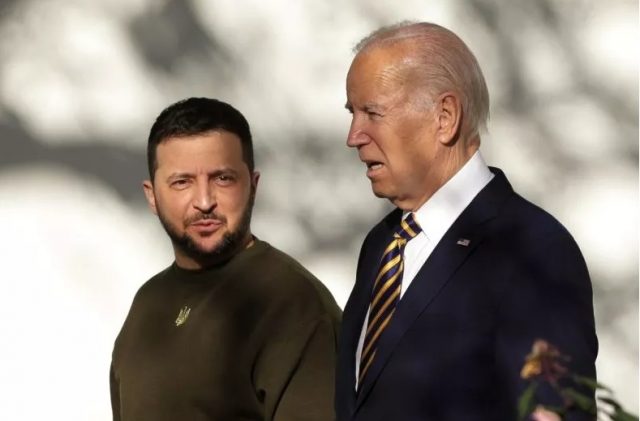
The military aid destined for Ukraine could be in jeopardy, with U.S. support increasingly being seen as “finite” by some lawmakers.
On Tuesday, Defense Secretary Lloyd Austin reaffirmed the United States’ commitment to Ukraine. Speaking at the Ukraine Defense Contact Group meeting in Brussels, Austin said the U.S. and Kyiv’s allies “continue to work together to provide Ukraine with full combat-credible capabilities and not just equipment.”
It had been reported the previous day that the Biden administration was gearing up to announce another aid package destined for Ukraine. According to The Washington Post, another tranche of “large military assistance” is expected to be unveiled within the next week.
“We will continue to try to impress upon them [Ukraine’s leaders] that we can’t do anything and everything forever,” one senior administration official told the paper.
“We will continue to try to impress upon them [Ukraine’s leaders] that we can’t do anything and everything forever,” one senior administration official told the paper.
Yet Austin described Kyiv as being at a critical juncture in the war effort, with the first anniversary of the invasion fast approaching.
“Ukraine has urgent requirements to help it meet this crucial moment in the course of the war,” he said on Tuesday.
Speaking in his evening address, Ukrainian President Volodymyr Zelensky said “speed is of the essence,” including in “carrying out decisions [and] shipping supplies.”
At the moment, bipartisan support for the U.S. financially backing Ukraine “remains fairly robust,” according to Rob Singh, professor of politics at Birkbeck, University of London.
Lawmakers are also likely to continue with their approval for Ukraine support packages if an anticipated Russian offensive “inflicts even more death and destruction,” he said.
Yet there is also a growth in how many Republicans believe the U.S. is giving Ukraine too much help, Singh told Newsweek. Many Republican congressmen still back sending aid, but a “small but important group of populist nationalists are much more skeptical.”
Earlier this month, Florida representative Matt Gaetz put forward a “Ukraine Fatigue Resolution,” in which he called for an end to the military and financial aid being sent to Ukraine, as well as a peace agreement.
“President Joe Biden must have forgotten his prediction from March 2022, suggesting that arming Ukraine with military equipment will escalate the conflict to ‘World War III,'” Gaetz said in a statement to Newsweek.
Several high-profile GOP voices, including Colorado Representative Lauren Boebert and Georgia Representative Marjorie Taylor Greene, backed the resolution.
This type of voice could make it increasingly difficult for strong aid measures to get through the House of Representatives now, compared with when Democrats held both the House and Senate, Singh said.
In October, now-House Speaker Kevin McCarthy said Republicans would not write a “blank check” for Ukraine should they regain control of the House. Now in a majority, there have been increasing questions about how much aid is funneled to Kyiv by Congress.
The Pew Research Center said in a report published on January 31 that a growing share of Republicans was taking the view that the U.S. is giving too much to Ukraine. Less than 1 in 10 Republicans and Republican-leaning independents held this view in March 2022, which has now increased to 40 percent, according to the poll.
Although lower for Democrats and Democrat-leaning independents, there was still an increase in this view among these groups, the poll showed.
“There has been a decline in the share of Americans who see the war as a direct threat to U.S. national security,” Singh said. This comes combined with attention increasingly turning to next year’s presidential race, he added.
“We can expect the war to become the subject of greater debate and division in the U.S.—especially if and when Donald Trump, and perhaps others on the non-interventionist right and left, begin to question its wisdom,” he said.
Opinion may also balance on how much European countries are contributing to Kyiv. Domestic critics will likely start to question Washington’s leading role in providing aid, should continental NATO states be “seen to be providing insufficient support, or even splitting, over Ukraine,” Singh said.
Support of this kind can never be infinite, Michael Clarke, professor in the War Studies department at King’s College London argued on Wednesday.
“These present indications of potential reluctance to continue are really only expressions of what is existentially true—that Ukraine must not just keep fighting this year but come up with some decisive shift on the battlefield that somehow shifts the dynamic clearly in its favor,” he told Newsweek.
This is a “pretty tall order” for Ukraine’s forces, he said.
Update 2/15/23, 11:53 a.m. ET: This article was updated with comment from Michael Clarke.







